|
|
|
Sort Order |
|
|
|
Items / Page
|
|
|
|
|
|
|
| Srl | Item |
| 1 |
ID:
131446
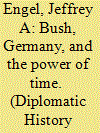

|
|
|
|
|
| Publication |
2013.
|
| Summary/Abstract |
George H.W. Bush backed German reunification with a puzzling degree of enthusiasm. His strategic reasoning was clear and not in dispute, as he desired to keep a unified Germany enmeshed within NATO. Less obvious, however, is his general forgiveness of Germany's past, for which he was pilloried. Yet history was much on Bush's mind in reaching these decisions. Germans had learned from the past, he argued. Europeans had not. They could not keep the peace no matter their ongoing political consolidation, his administration concluded by reading European history, without Americans in their midst. Bush backed unification, therefore, to ensure NATO's survival and thus an ongoing American presence on the continent. By studying Bush's sense of history, and a policymaker's historical sensibility more broadly, historians can thus gain greater insight into this decision and how strategic decisions are more generally formed
|
|
|
|
|
|
|
|
|
|
|
|
|
|
|
|
| 2 |
ID:
131449
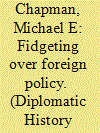

|
|
|
|
|
| Publication |
2013.
|
| Summary/Abstract |
When David Kennedy's magisterial Freedom from Fear criticizes Franklin Roosevelt's East Asian policy making it is to suggest that "a little appeasement-another name for diplomacy-might have yielded rich rewards." Some 430 pages earlier, Kennedy passed over the Stimson Doctrine, except to attribute its "timid" stance to isolationist public opinion, stressing instead how, "On the wind-scoured plains of Manchuria, Japan thus set the match in 1931 to the long fuse that would detonate the attack on Pearl Harbor." By setting aside what I call Tenaka teleology to concentrate on the psychological and ideological reasons for Henry Stimson's persistent interventionism following the Mukden (Shenyang) Incident, this article seeks to build on Kennedy's intimation that diplomatic appeasement could have slowed, detoured, or even stopped the Japanese juggernaut. After emphasizing Stimson's initial inaction, and then showing how U.S. diplomats and State Department officials-Stimson included-approved of Japan's involvement in Manchuria and sympathized with its difficulties there, this article argues that far from leaving well alone as realpolitik sensibilities demanded, Stimson acted instead to satisfy a string of personal affronts to his honor. God-fearing American elites, in his understanding, shouldered the responsibility of extending civilization westward, into Asia. As Secretary of State for the nation so charged by providence, Stimson internalized his role as the arbiter of moral behavior. Upstart Orientals running amok in the Pacific, particularly when they claimed to emulate Americans, roiled the order he felt it was his duty to police, offending his sense of self and jeopardizing his legacy.
|
|
|
|
|
|
|
|
|
|
|
|
|
|
|
|
| 3 |
ID:
131451
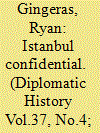

|
|
|
|
|
| Publication |
2013.
|
| Summary/Abstract |
This article provides an intimate survey of the construction and early evolution of one element of America's security relationship with Turkey: the development of joint counter-narcotics operations in the city of Istanbul. In exploring how American officials came to influence the policing of narcotics trafficking in Turkey's largest city between the years 1948 and 1960, this piece hopes to contribute to two specific historiographical issues. First, the research presented here adds to the growing body of literature on the history of U.S. antinarcotics policies on the world stage. Secondly, it attempts to shed new light on the relationship between Turkey's narcotics economy and the evolution of the modern Turkish state. A close reading of how both Turkish and American officials approached narcotics trafficking at this stage in the Cold War affirms the degree to which law enforcement officials (particularly in counter-narcotics efforts) constrained their efforts for the sake of larger national security prerogatives. The case present here in this article provides instructive examples of how the so-called "war on drugs," even at this embryonic stage, ultimately served to promote American hegemony in Turkey and beyond.
|
|
|
|
|
|
|
|
|
|
|
|
|
|
|
|
| 4 |
ID:
131448
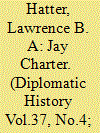

|
|
|
|
|
| Publication |
2013.
|
| Summary/Abstract |
This article reinterprets the Jay treaty by taking seriously the Republican criticism of the treaty's western provisions, which created a porous border between the United States and British-Canada. It argues that Laurentine merchants-entrepreneurs interested in the trade of the extended St. Lawrence River valley-used the Jay treaty as a charter, protecting their commercial and political rights as British subjects residing and trading in the United States. By exploring the conflicts between Laurentine merchants and federal officials over the terms of the Jay charter, this article opens a window on the complex process of state formation in the Anglo-American borderland between 1796 and 1819. It argues that state formation involved a wide array of activities and innovations at both the center and the periphery. More specifically, the article points to the important role that diplomacy, Republican commercial policy, and legal definitions of citizenship played in the creation of an American national state.
|
|
|
|
|
|
|
|
|
|
|
|
|
|
|
|
| 5 |
ID:
131454
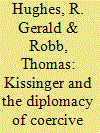

|
|
|
|
|
| Publication |
2013.
|
| Summary/Abstract |
The majority of scholarly accounts suggest that Anglo-Americans throughout the era of détente, 1969-1977, were often fraught with difficulties. In particular, the relationship between the Nixon administration and the British government of Edward Heath is often seen as the nadir for the Anglo-American relationship during the Cold War. Nonetheless, elements of the Anglo-American "special relationship," particularly those related to intelligence and nuclear co-operation, are often seen by scholars to have operated outside of these wider political difficulties. By utilising recently declassified documentation from both U.S. and UK archives, it is shown that both intelligence and nuclear co-operation were continually used by the United States as a means of convincing London to follow more amenable policy lines. With Henry Kissinger very much to the fore, it is illustrated how this coercive diplomacy had mixed results in achieving what Washington desired. Ultimately, this policy line would not accomplish what its main adherent, Henry Kissinger, sought.
|
|
|
|
|
|
|
|
|
|
|
|
|
|
|
|
| 6 |
ID:
131452
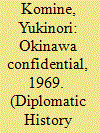

|
|
|
|
|
| Publication |
2013.
|
| Summary/Abstract |
This article demonstrates that during the 1969 Okinawa reversion negotiations, there were both secret agreements and disagreements between the U.S. and Japan regarding the conditions applied to the use of United States bases on Okinawa after reversion. The United States sought to preserve the unrestricted use of its bases on Okinawa for conventional combat operations in regional contingencies including Korea, Taiwan, and Indochina, as well as the emergency re-entry and transit rights of nuclear weapons. Due to the antinuclear public sentiment and fear of the entrapment into regional conflicts, Japan pursued the withdrawal of all nuclear weapons from Okinawa. While the United States insisted on making confidential written arrangements for the nuclear and base issues, Japan attempted to focus on public statements to explain mutual agreements but provided verbal private assurances. In the end, the United States and Japan agreed to maintain U.S. base functions for the continued U.S. deterrent capabilities in East Asia.
|
|
|
|
|
|
|
|
|
|
|
|
|
|
|
|
| 7 |
ID:
131453
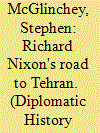

|
|
|
|
|
| Publication |
2013.
|
| Summary/Abstract |
By the time of Richard Nixon's arrival in office Iran had already become America's single largest arms purchaser. This was the result of an evolutionary process that had been underway for two decades. Nixon did not just change that evolutionary pattern of arms sales with Iran, he completely revised U.S. thinking on Iran's regional role. By the end of his first term in office, Nixon had leveraged U.S. Middle Eastern regional policy primarily around the focal point of a militarily strong, pro-U.S. Iran. In concert, the shah was encouraged to begin an unprecedented military spending spree. Consequently, in mid-1972 following a meeting of the two leaders in Tehran, Iranian annual purchases went, virtually overnight, from being measured in the tens of millions to being measured in the multi-billions. Tracing the complex evolution toward that meeting, and the accompanying policy shifts, form an underappreciated part of Cold War history.
|
|
|
|
|
|
|
|
|
|
|
|
|
|
|
|
| 8 |
ID:
131450


|
|
|
|
|
| Publication |
2013.
|
| Summary/Abstract |
In 1946, American architect Albert Mayer began a pilot project in "village reconstruction" for India. The resulting Etawah project in the northern Indian state of Uttar Pradesh helped inspire a national program in India and appeared as a model to U.S. policy makers, international organizations, and postcolonial leaders seeking to align peasants to elite development goals. Although it would be swept up in Cold War ambitions and in Cold War historiography, Etawah was not just a Cold War project or even simply an American or Indian project. Over time, Indians colluded with Americans in the erasure of Etawah's transnational roots and rewrote the pilot project for a range of, often contradictory, purposes. Unpacking the many versions of Etawah reveals that the origins of development as a field are to be found in transnational interchanges, contending national, imperial, and disciplinary visions, and conscious efforts to shape its meaning.
|
|
|
|
|
|
|
|
|
|
|
|
|
|
|
|
| 9 |
ID:
131447
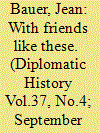

|
|
|
|
|
| Publication |
2013.
|
| Summary/Abstract |
In the summer of 1780, John Adams and the Comte de Vergennes crossed epistolary swords over America's status in the Franco-American Alliance. Understanding their irreconcilable policies explains how a minor dispute about paper money erupted into a fight over the control of post-war American commerce, which became a battle over the proper deployment of the French Navy in the New World, which led to mutual accusations of betrayal and treason. France thought the United States was its client state, bound to assist France against its enemies, particularly Great Britain. At the same time, American politicians followed the logic of the Model Treaty and "free ships make free goods" to claim America as a neutral state, free to sell its staple agricultural products to whomever offered the best price, including Britain. This difference underlies all the major conflicts of Franco-American relations through the end of the Napoleonic Wars.
|
|
|
|
|
|
|
|
|
|
|
|
|
|
|
|
|
|
|
|
|